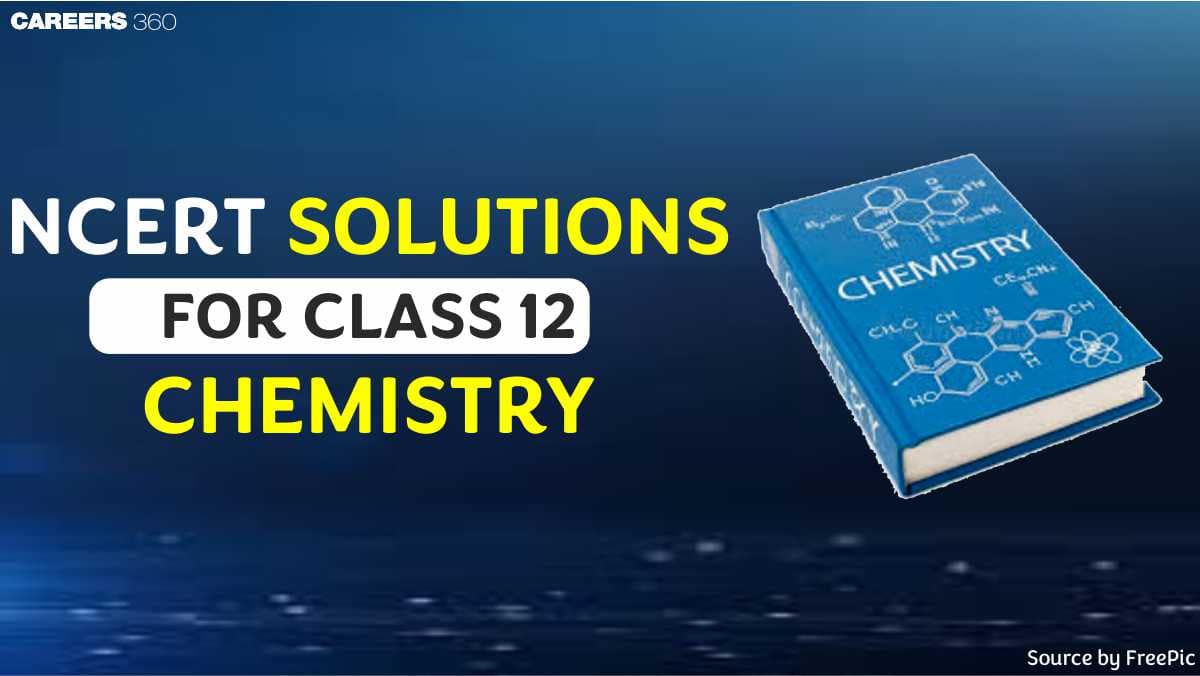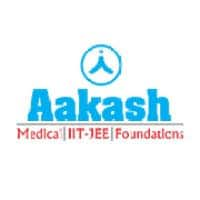Aakash Repeater Courses
Take Aakash iACST and get instant scholarship on coaching programs.
The chemistry curriculum for Class 12 NCERT contains very important chapters that are going to help students throughout their study. The solutions are designed in a very systematic way, which includes solutions to all the in-text and end-of-chapter exercise questions of every chapter. These solutions will enhance the concepts of students and suggest different ways to solve problems. The solutions for Chemistry are designed by our subject experts using logical and methodological approaches.
New: CBSE 12 Class Free Mock Test
CBSE Class 12 PYQ's: Physics | Chemistry | Biology | Maths | English
CBSE Class 12 PYQ's: Hindi | History | Economics | Geography
Also See: Online B.Sc | Online BA | Online BBA | Online BCA

Detailed solutions for the Class 12 Chemistry NCERT textbook are provided. Our solutions are very helpful whether you are revising any chapter or trying to master others. Solutions provided follow the latest CBSE syllabus and help students to understand concepts easily. Students can refer to the NCERT solutions designed by subject experts that provide easy-to-understand and comprehensive explanations of every question. NCERT solutions for Class 12 help students develop analytical and problem-solving abilities.
Chemistry Class 12 NCERT Solutions are provided for 10 chapters. For revision, students can use NCERT Notes, and for practice, students can refer to CBSE previous year papers.
These chapters are removed from the CBSE 2025-26 syllabus. Students can also refer to them for some additional knowledge from the links given below:
| The Solid State |
| Surface Chemistry |
| General Principles and Processes of Isolation of Elements |
| The P-block Elements |
| Polymers |
| Chemistry in Everyday Life |
Take Aakash iACST and get instant scholarship on coaching programs.
NCERT Class 12 Chemistry includes ten units. These solutions are explained with the help of necessary formulas and concepts. In addition, qualified academics and faculty members put a lot of effort into creating solutions, and they are very helpful for CBSE board exam preparation.
Chemistry is a vital subject, and it contains different topics starting from the basics and going to advanced levels. These solutions are created by our subject experts offer clear and systematic explanations of every question, making exam preparation simpler for students. NCERT Class 12 Chemistry covers a wide range of topics like chemical reactions, concepts, problem-solving techniques, and lab activities, and these questions help students to develop analytical thinking and problem-solving ability.
The chapter details of NCERT class 12 Chemistry are given below:
Solutions is one of the basic chapters of class 12 Chemistry. Various concepts related to solutions are discussed in this chapter like, different types of solutions, the concentration of solutions, Raoult's law, the vapor pressure of liquid solutions, colligative properties, and abnormal molar masses are discussed these chapter.
The topics of Chapter 1, Class 12 Chemistry are listed below:
|
1.3 Solubility |
|
1.4 Vapour Pressure of Liquid Solutions |
|
1.6 Colligative properties and determination of Molar mass |
|
1.7 Abnormal molar masses |
Electrochemistry is the study of the interconversion of chemical energy and electrical energy. Electrochemical cells, galvanic cells, and electrolytic cells, the difference between galvanic and electrolytic cells, the Nernst equation, the standard potential of the cell, and the Gibbs energy of the cell are the main topics discussed in the chapter.
The topics of Chapter 2, Class 12 Chemistry are listed below:
|
2.2 Galvanic cell |
|
2.3 Nernst Equation |
|
2.4 Conductance of Electrolytic solutions |
|
2.5 Electrolytic cell and Electrolysis |
|
2.6 Batteries |
|
2.7 Fuel Cells |
|
2.8 Corrosion |
Chemical kinetics helps students understand how chemical reactions occur. Chemical kinetics deals with the rate of reaction, both average and instantaneous, factors affecting the rate of reaction, the integrated rate equations, the temperature dependence on the rate of reaction, etc.
The topics of Chapter 3, Class 12 Chemistry are listed below:
|
3.2 Factors influencing Rate of Reaction |
|
3.3 Integrated Rate equation |
|
3.4 Temperature dependence of the Rate of reaction |
|
3.5 Collision theory of Chemical reaction |
The d- and f-block elements is one of the important chapters of Chemistry. The concepts discussed in the chapters are the d-block and f-block elements, including general and physical properties of the transition elements, the formation of complex and colored compounds, variation in ionic and atomic sizes of transition metals, and many more.
The topics of Chapter 4, Class 12 Chemistry are listed below:
|
4.1 Position in the periodic table |
|
4.2 Electronic configuration of the d- block elements |
|
4.4 Some important compounds of Transition elements |
|
4.5 The Lanthanides |
|
4.6 The Actinides |
|
4.7 Some applications of d- and f- block elements |
Coordination compounds is a conceptual chapter related to chemical reactions and atoms, this chapter covers important concepts like Werner’s theory of coordination compounds, definitions of some important terms pertaining to coordination compounds, the nomenclature of coordination compounds, etc.
The topics of Chapter 5 Class 12 Chemistry are listed below:
|
5.2 Definition of some important terms of coordination compounds |
|
5.3 Nomenclature of Coordination compounds |
|
5.5 Bonding in Coordination Compounds |
|
5.6 Bonding in metal carbonyls |
|
5.7 Importance and application of Coordination Compounds |
When a hydrogen atom is replaced by a halogen atom like F, Cl, Br, I in an aliphatic hydrocarbon it results in the formation of Haloalkane or alkane halide. The same goes for Haloarenes. Topics covered in this chapter are the IUPAC nomenclature of haloalkanes and haloarenes, important methods of preparation for haloalkanes and haloarenes, chemical and physical properties of organo-halogen compounds, and their uses are discussed in haloalkanes and haloarenes.
The topics of Chapter 6, Class 12 Chemistry are listed below:
|
6.1 Classification |
|
6.2 Nomenclature |
|
6.3 Nature of C-X bond |
|
6.4 Methods of preparation of Haloalkanes |
|
6.7 Chemical Reactions |
|
6.8 Polyhalogen compounds |
Alcohols are formed when a hydrogen atom in an aliphatic hydrocarbon is replaced by an OH group and Phenols are formed when a hydrogen atom in an aromatic hydrocarbon is replaced by an OH group while Ethers are formed by the substitution of an H-atom in a hydrocarbon by an alkoxy(R-O). This chapter starts with the IUPAC nomenclature of alcohols, phenols, and ethers. In this chapter for class 11, we will study the chemistry of three classes of compounds, which are alcohols, phenols, and ethers, and also discuss the reactions for the preparation of alcohols, phenols, and ethers.
The topics of Chapter 7 Class 12 Chemistry are listed below:
|
7.1 Classification |
|
7.2 Nomenclature |
|
7.3 Structures of functional groups |
|
7.5 Some commercially important alcohols |
|
7.6 Ethers |
Aldehydes, ketone, and carboxylic acid is one of the most important topics of organic chemistry. It is an important chapter for the class 12 students because this chapter holds a good part of the marks in the CBSE board exam. In this chapter, we will study the organic compounds containing carbon-oxygen double bonds (>C=O) called the carbonyl group. The carbonyl group (>C=O) is one of the most important functional groups in organic chemistry.
The topics of Chapter 8, Class 12 Chemistry are listed below:
|
8.1 Nomenclature and Structure of Carbonyl compound |
|
8.3 Physical properties |
|
8.5 Uses of Aldehydes and Ketones |
|
8.7 Methods of preparation of Carboxylic acids |
|
8.8 Physical properties |
|
8.9 Chemical reactions |
|
8.10 Uses of Carboxylic acid |
In this chapter, students will deal with organic compounds of amines and learn about amines and diazonium salts. This unit deals with organic compounds called amines. Subtopics covered in this chapter are the structure, nomenclature, and classification of amines, as well as the chemical and physical properties and method of preparation of diazonium salts.
The topics Chapter 9 Class 12 Chemistry are listed below:
|
9.1 Structure of Amines |
|
9.2 Classification |
|
9.3 Nomenclature |
|
9.5 Physical properties |
|
9.6 Chemical reactions |
|
9.7 Methods of preparation of Diazonium Salts |
|
9.8 Physical properties |
|
9.9 Chemical reactions |
|
9.10 Importance of diazonium salt in synthesis of Aromatic compounds |
Biomolecules are the essential organic compounds. They play a vital role in living organisms. Some of the important topics discussed in this chapter are the characteristics and structures of biomolecules like carbohydrates, proteins, nucleic acids, hormones, DNA, and RNA, and also describe the role of biomolecules in the biosystem.
The topics in Chapter 10, Class 12 Chemistry, are listed below:
|
10.1 Carbohydrates |
|
10.2 Proteins |
|
10.3 Enzymes |
|
10.4 Vitamins |
|
10.5 Nucleic acid |
|
10.6 Hormones |
There are numerous concepts in each chapter of the NCERT Class 12 textbook that may add to the student's mental stress. Therefore, to effectively remember all the concepts in the NCERT textbook for class 12 chemistry, it is essential to first understand the tips and tricks. Download NCERT Class 12 Books here.
The following are the points that can help you build a good approach to solve the questions of Class 12 Chemistry
Students must identify the type of question, like whether the question is a numerical question, a multiple answer type question or a descriptive question.
While solving any question, it is very important to read the question carefully and identify what is given and what we need to find out.
The basic tip to solve any question is to write down the given data and convert all the units of the given quantity into SI units to avoid confusion.
After identifying the type of question and the given terms then we have to choose the most appropriate formula, put the given values into the formula, solve the values, cancel values and units, if necessary, because it will simplify the calculation.
A systematic approach is very helpful because it clearly shows every step, due to which question looks representable and neat, which can get you extra marks in your board exams.
While writing the final answer, the final answer needs to look clear. So, always box the final answer to differentiate it, and never forget to mention the unit with the final answer
7) Practice multiple questions, as practice is necessary for conceptual clarity and accuracy. Students can refer NCERT textbook and the NCERT exemplar questions.
Students can refer NCERT books and syllabus from the links given below:
Class 12 is an important stage in the lives of students. The CBSE board has divided the entire course into sections with marks according to the exam pattern. Based on the importance and weight of the marks in the CBSE exams, all the chapters have been divided. In order to give the Class 12 students a quality education and assist them in achieving their future objectives, this is being done.
|
Chapter No. |
Chemistry Class 12 Chapters |
Marks |
|
1. |
Solutions |
7 |
|
2. |
Electrochemistry |
9 |
|
3. |
Chemical Kinetics |
7 |
|
4. |
The d- and f-Block Elements |
7 |
|
5. |
Coordination Compounds |
7 |
|
6. |
Haloalkanes and Haloarenes |
6 |
|
7. |
Alcohols, Phenols, and Ethers |
6 |
|
8. |
Aldehydes, Ketones, and Carboxylic Acids |
8 |
|
9. |
Amines |
6 |
|
10. |
Biomolecules |
7 |
|
Total |
70 |
We have ensured that the solutions for the NCERT Chemistry class 12 are written in fairly simple language and cover all the essential concepts. There are no errors at all, and the solutions are simple to understand. As the best books for preparing for both school and board exams, NCERT textbooks are recommended by CBSE.
The hyperlinks to the NCERT solution of each subject is given below:
The hyperlinks to the NCERT subject-wise notes are given below:
NCERT solutions for class 12 chemistry are the detailed and comprehensive answers to the questions. Solutions are designed to help students to understand various concepts easily.
NCERT solutions are beneficial for exam preparation as they provide detailed and concise answers to questions. By practicing these questions students can enhance their practical knowledge and problem-solving ability.
Students can better understand the questions by using the NCERT Intext Solutions Class 12 Chemistry. Students will be able to gain a thorough understanding of the ideas covered in each chapter and boost their self-assurance to perform well on exams. Students can identify their areas of weakness and work on them with the assistance of the faculty-designed solutions to improve their grades.
NCERT solutions provide a strong base understanding and practicing NCERT concepts but with this to score good marks on the CBSE board students must supplement their studies with other resources such as reference books and previous year papers.
Yes, NCERT Solutions for Class 12 Chemistry can be quite useful for competitive exams. Many competitive exams in India, such as JEE and NEET, base a significant portion of their syllabus on the NCERT curriculum.
Changing from the CBSE board to the Odisha CHSE in Class 12 is generally difficult and often not ideal due to differences in syllabi and examination structures. Most boards, including Odisha CHSE , do not recommend switching in the final year of schooling. It is crucial to consult both CBSE and Odisha CHSE authorities for specific policies, but making such a change earlier is advisable to prevent academic complications.
Hello there! Thanks for reaching out to us at Careers360.
Ah, you're looking for CBSE quarterly question papers for mathematics, right? Those can be super helpful for exam prep.
Unfortunately, CBSE doesn't officially release quarterly papers - they mainly put out sample papers and previous years' board exam papers. But don't worry, there are still some good options to help you practice!
Have you checked out the CBSE sample papers on their official website? Those are usually pretty close to the actual exam format. You could also look into previous years' board exam papers - they're great for getting a feel for the types of questions that might come up.
If you're after more practice material, some textbook publishers release their own mock papers which can be useful too.
Let me know if you need any other tips for your math prep. Good luck with your studies!
It's understandable to feel disheartened after facing a compartment exam, especially when you've invested significant effort. However, it's important to remember that setbacks are a part of life, and they can be opportunities for growth.
Possible steps:
Re-evaluate Your Study Strategies:
Consider Professional Help:
Explore Alternative Options:
Focus on NEET 2025 Preparation:
Seek Support:
Remember: This is a temporary setback. With the right approach and perseverance, you can overcome this challenge and achieve your goals.
I hope this information helps you.
Hi,
Qualifications:
Age: As of the last registration date, you must be between the ages of 16 and 40.
Qualification: You must have graduated from an accredited board or at least passed the tenth grade. Higher qualifications are also accepted, such as a diploma, postgraduate degree, graduation, or 11th or 12th grade.
How to Apply:
Get the Medhavi app by visiting the Google Play Store.
Register: In the app, create an account.
Examine Notification: Examine the comprehensive notification on the scholarship examination.
Sign up to Take the Test: Finish the app's registration process.
Examine: The Medhavi app allows you to take the exam from the comfort of your home.
Get Results: In just two days, the results are made public.
Verification of Documents: Provide the required paperwork and bank account information for validation.
Get Scholarship: Following a successful verification process, the scholarship will be given. You need to have at least passed the 10th grade/matriculation scholarship amount will be transferred directly to your bank account.
Scholarship Details:
Type A: For candidates scoring 60% or above in the exam.
Type B: For candidates scoring between 50% and 60%.
Type C: For candidates scoring between 40% and 50%.
Cash Scholarship:
Scholarships can range from Rs. 2,000 to Rs. 18,000 per month, depending on the marks obtained and the type of scholarship exam (SAKSHAM, SWABHIMAN, SAMADHAN, etc.).
Since you already have a 12th grade qualification with 84%, you meet the qualification criteria and are eligible to apply for the Medhavi Scholarship exam. Make sure to prepare well for the exam to maximize your chances of receiving a higher scholarship.
Hope you find this useful!
hello mahima,
If you have uploaded screenshot of your 12th board result taken from CBSE official website,there won,t be a problem with that.If the screenshot that you have uploaded is clear and legible. It should display your name, roll number, marks obtained, and any other relevant details in a readable forma.ALSO, the screenshot clearly show it is from the official CBSE results portal.
hope this helps.

Take Aakash iACST and get instant scholarship on coaching programs.

This ebook serves as a valuable study guide for NEET 2025 exam.

This e-book offers NEET PYQ and serves as an indispensable NEET study material.
As per latest syllabus. Physics formulas, equations, & laws of class 11 & 12th chapters
As per latest syllabus. Chemistry formulas, equations, & laws of class 11 & 12th chapters
As per latest 2024 syllabus. Study 40% syllabus and score upto 100% marks in JEE